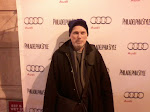unknown auden
A student film maker from N.Y.U. interviewed me about W.H. Auden. Auden was no unknown citizen. I confirmed the usual impressions. I had observed him on a panel at Columbia’s School of the Arts. Auden was slightly overweight and extraordinarily wrinkled. He dressed casually -- he even wore slippers. After an hour, he glanced at his watch, said he had to go, and shuffled on out. He was 63-years-old.
Then I saw him read to a huge sold-out audience at the 92nd Street Y. He recited his own poems by heart. Only once did he falter--did he glance quickly at a manuscript on the podium, or merely flip his hand a few beats to jog his memory? He seemed seamlessly to resume.
Auden was on TV! He was no actor but he had his lines down. Dick Cavett asked him questions. Auden tended to quote himself with his answers. He didn’t look at Cavett or at the camera.
So finally the time came to phone him and arrange our hour of interview. “I’ll be there promptly at 4:00pm,” I told him, “with my tape recorder.”
“No tape recorder,” he said. He then disparaged cameras, and clicked off.
Auden’s apartment was being broken up. Books and opera records were in piles or in boxes. Shelves were half-empty. He was leaving St Mark’s Place for Oxford, England.
At the end of his life, Auden’s poetry seemed to collapse into a faggy folksiness, a campy pointlessness. The poems were certainly charming but--why bother? They were in any case the opposite of The Orators, his willfully obscure and scarcely readable second book. Allen Ginsberg wrote a homage to this particular vein of camp verse in Indian Journals and it amused me mightily. I asked Auden if he liked Ginsberg’s homage. Auden seemed excited; he’d never seen it, and asked me to send it to him.
Months later I told Ginsberg how much I liked that homage. Ginsberg wondered if Auden had seen it.
“Auden’s seen it,” I said. “I sent it to him.”
Ginsberg looked stricken. “My poem was mean,” he said.

